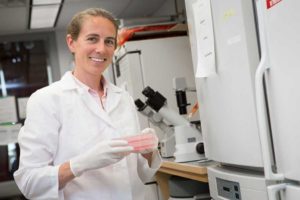
Researchers study PKD and PLD to determine genes involved cyst formation
A team of Yale researchers is studying polycystic kidney disease (PKD) and polycystic liver disease (PLD) to determine which genes are involved in the formation of cysts.
The researchers, including PKD Foundation Fellow Whitney Besse, M.D., hope to develop effective treatments by improving the understanding of the genes involved in kidney and liver cyst formation.
Kidney cysts are round pouches of fluid that form in the kidneys. Autosomal dominant polycystic kidney disease (ADPKD), the more common form of PKD, is caused by mutations in the PKD1 or PKD2 genes. Autosomal recessive polycystic kidney disease (ARPKD), the more rare form of PKD, is caused by mutations in a gene called PKHD1. Cysts can also form in other organs, with the liver being the most common.
While it’s common for patients to have both PKD and PLD, some patients only have liver cysts, a disease known as isolated polycystic liver disease (PCLD). Unlike patients with kidney cysts, patients with PCLD don’t have kidney failure. It’s typically benign but can lead to symptoms in rare cases where the liver becomes very large. And the cysts form due to the same disease process as those in the kidney, the details of which are an important area of investigation. To deepen understanding of why liver and kidney cysts form, the team of Yale researchers examined the genes of patients with liver cysts.
According to an article from YaleNews, “the researchers identified four additional genes associated with PLCD. This discovery demonstrated that many different genes are involved in the process of cyst formation. Interestingly, one of the identified genes was PKHD1, suggesting that a subset of carriers of PKHD1 mutations (parents of children with the juvenile form of PKD) can present with PCLD.” This finding supports a common mechanism of disease between both forms of PKD and PCLD.
 In 2015, Dr. Besse was awarded a fellowship through the PKD Foundation’s Fellowship program for her work on this study.
In 2015, Dr. Besse was awarded a fellowship through the PKD Foundation’s Fellowship program for her work on this study.
“I am so grateful for the PKD Foundation’s support and the participation of the many patients whose DNA held some very useful information for us.”
She hopes that studying the genetics of patients with PCLD can identify genes that modulate cyst development – knowledge which would shed light on pathways toward effective PKD treatments.
Dr. Besse and her colleagues plan to further study the underlying mechanisms of these diseases and how they might interact.
Content was pulled from the YaleNews article, Study finds four genes linked to cystic diseases of the liver and kidney
Read the full study published in the Journal of Clinical Investigation.
Upcoming Town Halls
Florida
Oklahoma
Congressman Tom Cole, OK-04
Moore Town Hall
Date: September 6, 2019
Time: 12 p.m.
Location: Moore Public Library Community Room, 225 S. Howard Ave., Moore, OK
Congresswoman Kendra Horn, D-OK-05
Oklahoma City Town Hall
Date: September 30, 2019
Time: 6 p.m.
Location: NorthCare Pete White Health and Wellness Center, 4021 S. Walker Avenue, Oklahoma City, OK.
South Carolina
Congressman Ralph Norman, R-SC
Cherokee County Town Hall
Date: September 4, 2019
Time: 11:30am
Location: Fatz Cafe in Gaffney
Virginia
Congressman Derek Kilmer, D-WA-06
Gig Harbor Town Hall
Date: September 3, 2019
Time: 5:30 p.m.
Location: Peninsula High School Auditorium, 14105 Purdy Dr. NW, Gig Harbor, WA 98332
Forks Town Hall
Date: September 4, 2019
Time: 5:30 p.m.
Location: Rainforest Arts Center, 35 N Forks Ave, Forks, WA 98331
Telephone Town Hall
Date: September 9, 2019
Time: 5pm
Instructions: Residents of the 6th District who would like to join the call can send an email to kilmer.teletownhall@mail.house.gov with their name, address, and phone number by Sunday, September 8. Residents who sign up before the deadline will receive a phone call on Monday, September 9 inviting them to the telephone town hall.







